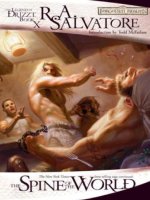WORLD BOOK WORLD BOOK WORLD BOOK 0058 0058
Bạn đang xem bản rút gọn của tài liệu. Xem và tải ngay bản đầy đủ của tài liệu tại đây (1.03 MB, 1 trang )
• Mrenkulkja are seafarers who sail the remaining
northern oceans as both fishermen and raiders.
Their numbers in these dark days are unknown,
but they once dominated the waves with enormous
fleets of oaken ships.
• Vallitag are Nordran marriage brokers, a profession
respected and feared.
• Karhuna are rugged wildermen who train bears
and wolves to do their bidding. Karhuna are individualists who protect their privacy.
• Urshkarl are urshevan handlers and trainers, skilled
in trapping them while young and keeping them
alive in captivity.
• Kotkarl are “eagle seers” who use them to scout
and send messages; eagles are symbols of strength
among the Nordor.
• Skaal are “woe-weavers” or tale-spinners with at
least one in each generation having psychic abilities, whether as a Sarhak, Trakeen, or a Shadazim.
Customs & Culture
The northern lands are as harsh as the south in many
ways, though for different reasons, and the means to
survive there are as varied as the terrain. The Nordor
prize the individuality necessary to make one’s way in
the wilderness, and respect initiative and cleverness. As
a result, their traditions are localized, not spread across
the tribe as a whole, and their tolerance for different beliefs and lifestyles is high. Just as there are many types
of snow, so too are the Nordor across the north.
Not surprisingly, the tribesmen distrust all non-Nordor, though they are mostly tolerant of outsiders. One
must earn their trust and, once lost, it is nearly impossible to win it back.
The Nordor greet each other with long, deep embraces,
ostensibly to give each one time to whisper their name and
a formal greeting to the other, but essentially the action is
to exchange body heat. When hunting, Nordor gorge on a
kill that cannot be preserved, to the point of lethargy and
food-induced sleep. Hoarding food is a taboo; if it is available, then everyone deserves at least enough food to not
starve, though repeated freeloaders are not tolerated.
Marriage without the approval of a Vallitag is forbidden, and the old marriage brokers can be especially
stubborn or procrastinating at times, to the exasperation of young Nordran lovers. Youths of both genders
must survive a week in the frozen wilderness (or sail
across a frozen sea) to attain adulthood. Failure in the
endeavor brings shame to the family, so some elect
self-banishment and wander south in search of other
fortunes rather than fail their families. Elderly moth56
ers and grandmothers recite the record of each family
and its deeds, loves, and losses weekly. The song takes
on new exaggerations and twists over the generations,
but it is rude to dismiss or challenge a song’s contents,
no matter how far fetched the tales.
Blood feuds darken many Nordor communities, generations old with no sign of abeyance. Insults are taken
hard and kin stick together against adversaries. Once
a slight has been offered or a taboo breached, they revert to stubborn ways and attitudes. Nordor make slaves
of captives, as slavery is the punishment for military
failure. This failure does not extend to the children of
slaves, so subsequent generations are born free. Such
slaves are put to difficult and untouchable tasks, and
their lot in life is unpleasant at best.
The Nordor proudly carry forward the ways of their
ancestors:
• Stone Builders: Nordor are master stone builders and
their quarries supply all manner of marble, granite,
sandstone, and other building materials. They erect
truly massive walled cities in the distant north, far
from the paths of many southern visitors (which is
why most think the Nordor not very civilized, having
only seen their wandering encampments).
• Skilled Miners: Nordran miners dig deep into the
bowels of the earth, and do so fearlessly. They also
excavate enormous underground caverns as complex and massive as their cities, creating domains
of magnificent splendor far greater than first presumed when encountered from above or below.
• Taulu Manuals: The Nordran Taulu (tablets) are the
original stone manuals of collected lore on mining and construction, their tribe’s essential crafts.
These actual stone tablets, older than 100 generations, hold a cult-like status and are well guarded,
secure in the mountain fastness of Pohjos-Paika.
• Cremation: Nordor cremate their dead, their bodies lashed to wooden crosses and set alight on the
fifth dawn after their passing.
• Birth Gifts: Any new birth heralds a gift-giving ceremony from the family to everyone of importance
to them in the community.
• Shadow Cognizance: Nordor never let their shadow
fall on a known superior—an insult punishable by
dismissal or thrashing among military ranks.
• Boneshards: There are Nordor Boneshards who stash
weapons beneath the skins of the urshaven mounts.
Of Great Dragons & Glaciers
Of all the human tribes, the Nordor harbor the least
concerns over the absence of the Dragon Kings. Those
few who held sway over the northern lands allowed









